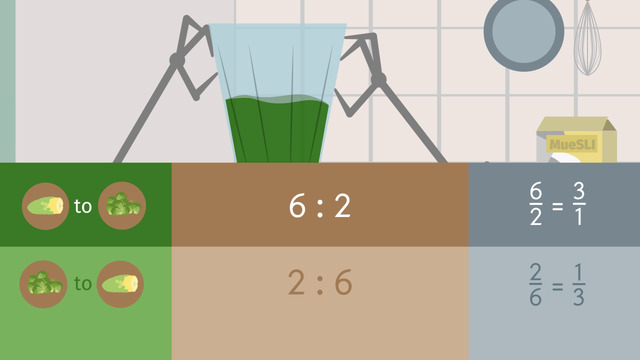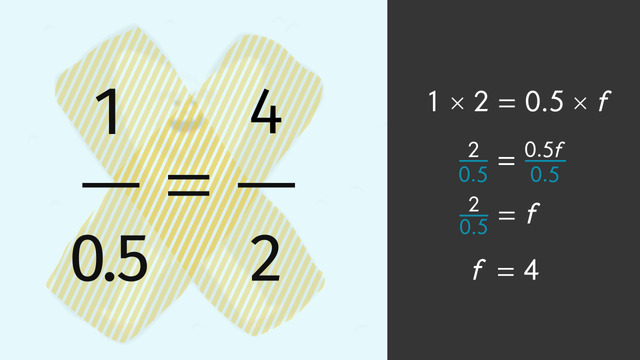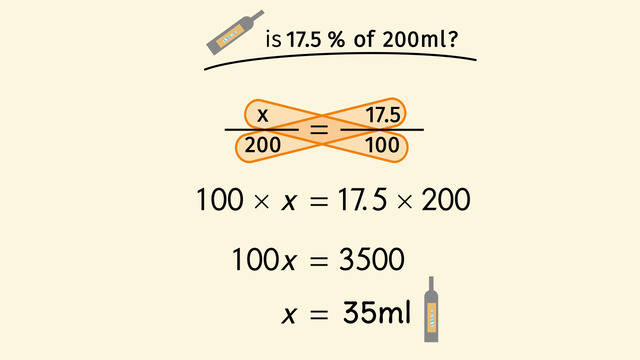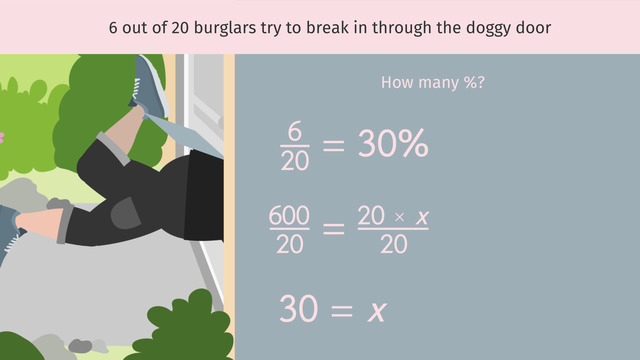Convert between Percent, Fractions and Decimals
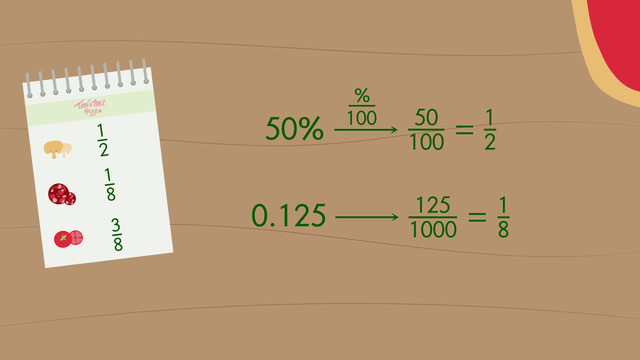

Basics on the topic Convert between Percent, Fractions and Decimals
Percent, Fractions, and Decimals can represent the same value in different formats. For example, the benchmark value of 50% is the same as ½ and 0.50. To make algebra calculations and real life calculations easier, learn to convert between percents, fractions, and decimals.
To convert a decimal to a percent: multiply by 100 or move the decimal point two spaces to the right then add the percent sign. To convert a decimal to a fraction, use place value to help you determine the denominator, and remember to reduce to lowest terms.
To convert a fraction to a decimal, use long division to divide the numerator by the denominator, and to convert that number to a fraction, multiply the quotient by 100 then add the percent sign. It’s easy to convert a percent to a fraction. Remember percent means per cent or per hundred, so place the number value of the percent over 100 then reduce the resulting fraction to lowest terms.
Understanding the relationship of percents, fractions, and decimals and how to calculate equations including percents, fractions, and decimals is very important in the real world, especially for making good consumer decisions. To learn how to use a helpful graphic aid to make conversions easier, watch this video.
Convert between formats to solve problems. CCSS.MATH.CONTENT.HSA.SSE.B.3
Transcript Convert between Percent, Fractions and Decimals
This is Toni. He's the owner of "Toni's 100% Pizza," which is famous for its delicious, customized pizzas. At the moment, he's taking a customer's order.
The customer orders a pizza with 50% mushrooms, 0.125 of pepperoni and three-eighths tomatoes. Hmm, that is a weird order! How can Toni make such a pizza?
What does Percent mean?
To fulfill this order, Toni has to convert between percents, decimals, and fractions.
Let's start with converting decimals and fractions to percents. Percent means 'per hundred' and describes part of a whole just like fractions and decimals.
If the pizza were cut into 100 slices, 1 slice would equal 1 percent. The percent sign looks like two little zeros with a diagonal line dividing them... or maybe a division sign that lost its balance.
Converting Decimals and Fractions to Percents
Let's convert decimals to percents. To convert a decimal to a percent you first multiply by 100. 0.125 multiplied by 100 is 12.5. Now we add the percent sign. So the answer is 12.5%.
Now let's convert fractions into decimals. The numerator is divided into the denominator by using long division.
8 is written outside of the division sign and 3 is written under the division sign. As you know, 8 can't go into 3, so you put a zero followed by a decimal point above the division bar and add point zero zero zero after the 3.
Then, see if 8 can go into 30; yup! 3 times. 3 times 8, is 24. We subtract this from 30, leaving us with 6. The next 0 is brought down to be the next digit. This process is repeated until the remainder is 0. The result is 0.375.
Now you just have to convert the decimal 0.375 to a percent. You already know: multiply by 100 and then add the percent sign! Finally you get 37.5%.
Converting Percent and Decimals into Fractions
Now, Toni can make the pizza. 50 percent mushrooms, which is easy. But, what about 12.5 and 37.5 percent? Maybe we should convert everything into fractions.
Let's start with 50%. Write the percent divided by 100. So you have 50 over 100. Then reduce the fraction. This gives us one-half.
Now let's convert 0.125. 0.125 means 125 thousandths. So you write 125 as the numerator and 1000 as the denominator. Now reduce the fraction. The answer is one-eighth.
Now, Toni can make the pizza. The remaining part has one-eighth pepperoni. And there are three-eighths tomatoes.
Remember how to convert between Percents, Fractions and Decimals
To remember better how to convert between percents, fractions and decimals, you can use this triangle.
- You can convert percents to fractions by dividing them by 100. Remember to reduce the fraction.
- If you want to convert a fraction to a decimal, just divide the two numbers and there you have it!
- To convert decimals to a percent, multiply the decimal by 100 and add a percent sign.
Let's see what Toni does as payback for this prankster.
Convert between Percent, Fractions and Decimals exercise
-
Describe how to convert a decimal number or a fraction into a percent.
HintsAs you know, $\frac12$ and $0.5$ are the same.
You probably know how to write this as a percent.
The picture on the right shows how to convert the fraction $\frac 38$ into its decimal form.
SolutionIf you need to compare numbers, it's helpful if all the numbers appear in the same form.
Compare Like Forms
- fractions $~\leftrightarrow~$ fractions
- decimals $~\leftrightarrow~$ decimals
- percents $~\leftrightarrow~$ percents
To convert a decimal number into percent:
- multiply the decimal by $100$
- put a percent sign behind the number
- $0.125\xrightarrow{\times 100}12.5\%$
- calculate the decimal form of the fraction by dividing the numerator by the denominator
- use the steps you learned to change a decimal into a percent
- that means: $\frac38=0.375\xrightarrow{\times 100}37.5\%$
-
Help Toni convert the customer's strange order.
HintsDid you know you can also reducing fractions using factors? To simplify a fraction to its lowest terms, divide the numerator as well as the denominator by a common factor. Repeat until there are no more common factors.
SolutionTo convert a percent into a fraction, we write the percent as a fraction divided by $100$ and then simplify the fraction by dividing the numerator as well as the denominator by the Greatest Common Factor.
- $50~\%=\frac{50}{100}=\frac12$
- $50~\%=\frac{50}{100}=50 \div 100= 0.5$
- $50~\%= 50 \div 100= 0.5$
- $0.125=\frac{125}{1000}=\frac18$
- $0.125=0.125 \times 100 \%=12.5\%$
- $\frac {3}{8}=3 \div 8= 0.375$.
- $\frac {3}{8}=3 \div 8= 0.375=0.375 \times 100 \%=37.5\%$
-
Convert each number from its current form to percent form.
HintsYou can simplify a fraction by dividing the numerator and the denominator by the GCF: $\frac{10}{20}=\frac{10\div 10}{20\div 10}=\frac12$.
SolutionThere are $4$ percent values given. We can convert percent into a fraction by writing $8\%$ as $\frac8{100}$. This fraction can be simplified to $\frac2{25}$ by dividing the numerator and denominator by $4$. You can convert percent into decimal form by dividing the percent by $100$. In our example above, we have $8\%=0.08$.
- $75~\%=0.75~\longleftrightarrow~75\%=\frac{75}{100}=\frac34$
- $25~\%=0.25~\longleftrightarrow~25\%=\frac{25}{100}=\frac14$
- $40~\%=0.40~\longleftrightarrow~40\%=\frac{40}{100}=\frac25$
- $55~\%=0.55~\longleftrightarrow~55\%=\frac{55}{100}=\frac{11}{20}$
-
Change fractions or decimals into percent form.
HintsAll the percentages should add up to $100\%$.
To convert a decimal number into percent, multiply by $100$, and then write a percent sign at the end of the resulting number.
To transform a fraction to percent:
- Convert the fraction into a decimal, and then multiply by $100$
- or scale raise terms so that the denominator is equal to $100$ as shown in the picture
SolutionToni's guest orders a pizza with the following ingredients:
Olives: $\frac15=\frac{1\times 20}{5\times 20}=\frac{20}{100}=20\%$
Onions: $0.30\xrightarrow{\times 100}30\%$
Pepperoni: $\frac3{20}=0.15\xrightarrow{\times 100}15\%$
Chili Peppers: $0.35\xrightarrow{\times 100}35\%$
-
Explain the meaning of percent.
Hints$100¢$ are in $\$1$.
Here we have a customary percent sign.
$1\%$ of $\$1$ is $1¢$.
SolutionWe can remember the meaning of percent for example by conversion from cent to dollar:
- $100¢$ are in $\$1$
- $\frac1{100}$ of $\$1$ is $1¢$
If Toni divides his pizza in $100$ even slices, we can say that one slice equals $1\%$ of the pizza.
-
Prepare your own pizza.
HintsEach value is given as a fraction. If possible, simplify each fraction.
The pizza is divided in $10$ slices. Write each fraction with the denominator $10$. The number of slices is written in the numerator.
SolutionSince the pizza is divided into $10$ slices, we should try to convert each fraction so that we get $10$ in the denominator. Then, we can easily compare the fractions to each other.
- $\frac3{15}=\frac15=\frac2{10}$, or $2$ slices with pepperoni
- $\frac{16}{40}=\frac{16\div 4}{40\div 4}=\frac4{10}$, or $4$ slices with cheese
- $\frac{15}{50}=\frac{15\div 5}{50\div 5}=\frac3{10}$, or $3$ slices with mushrooms
- $\frac{3}{30}=\frac{3\div 3}{30\div 3}=\frac1{10}$, or $1$ slice with bacon


